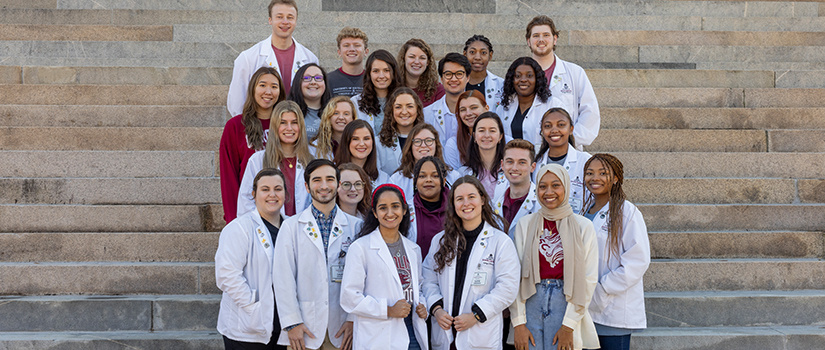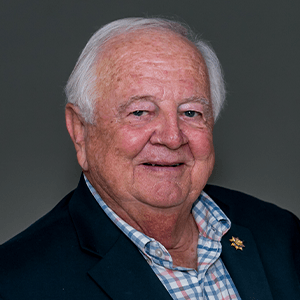When students have the opportunity to attend a professional development conference where they network with peers and talk with pharmacy professionals about the industry, it is often an eye-opening experience.
“They become motivated to truly advocate for and change the pharmacy professions based on their networking exchanges with professionals around the country, the research they present to attendees and the legislative processes in which they participate,” says Amy Grant, associate dean for Student Affairs in the College of Pharmacy.
“Repeatedly, I also see involvement at professional meetings changes students’ career trajectories.”
Developing students who care about their profession is of great interest to alumnus Ken Couch, ’69, who saw his career advance from a community pharmacy to leading a multibillion-dollar pharmaceutical distribution company as its president.
“I ended up being a pharmacist’s pharmacist – developing pharmaceutical software and computer software for community pharmacists,” he says. “Then I moved on to distribution. One way to know about all the many things a pharmacist can do is to talk with pharmacists from different settings.”
Couch credits Robert Beamer, distinguished professor emeritus for the college who passed away in December 2022, with having a profound impact on him, as they visited area high schools, hoping to convince students to pursue a career in pharmacy.
“I want to share the depth of the profession with students, to have them understand the wonderful opportunities and have a broader view of what the profession is about,” he says.
“You cannot get that sitting at a desk as a P1. You can study a book all day long, but that will not teach you about interacting with your patients. Attending meetings, you have a chance to meet those who can change your perspective and help develop a career path for what you should truly be doing.”
Hirali Patel, ’22, joined Carolina Pharmacy as a clinical pharmacist after graduation. She saw options open up for her after attending the college’s annual career expo.
“I originally did not see myself in a community pharmacy setting,” Patel says. “I was residency bound until Carolina Pharmacy visited our school, and I saw how they work with patients and implement their goals.
“Networking and leadership opportunities have helped build my skills and to be better prepared for the real world,” she adds. “Having a career mentor was extremely valuable for me, and as alumni, it is important for us to do what alumni did for us as students, in providing insight into the pharmacy profession.”
Jessica Shue, ’21, is now a post-doctoral fellow with Novartis and is helping to develop students on a pathway of which she was unaware as a student.
“Taking on different leadership roles as a student helped me to develop key skills that were directly transferrable to my fellowship and set me with a good foundation,” she says. “The skills I learned – interacting with professors, working with my peers and learning to communicate with them – have had a tremendous impact.”
As a student pharmacist, Jacob Jordan King, Class of 2024, and president of the College of Pharmacy Student Government Association, quickly realized the value of being involved in student organizations.
“The college does an excellent job of providing opportunities to grow into the profession, but you also should step beyond what the university offers and develop yourself,” he says. “Be a mentor, be a role model, and learn by doing. At the end of the day, no matter how much you know, if you cannot interact with others and be part of a team, you will not be much good to your patient or help to improve the profession.”
Funding is crucial for students to attend professional development opportunities outside of the college. Without such support, many students would not have access to these experiences.
“Our hope is to increase the number of students who attend activities outside of the curriculum,” Grant says. “Every good leader will tell you that something sparked their momentum, and the more resources we can designate toward student professional development, the more leaders we will send out into our phenomenal profession.”
Couch hopes other alumni will share their experiences with students and young professionals.
“Help to broaden students’ views of the profession, instill in them the vision to
see what the profession can be in the future, and share your knowledge,” he says.
“Mentoring students helps fortify the profession and is necessary for the profession
to replenish itself with high quality practitioners. I felt it was important to give
back, to be involved – it all relates to advancing the profession of pharmacy.”
If you are interested in furthering the professional development of students as a mentor, by sharing your experiences, or supporting student travel to professional conference meetings, email alumni@cop.sc.edu.
Topics: Pharm.D. Program, Student Experience, Support the College

